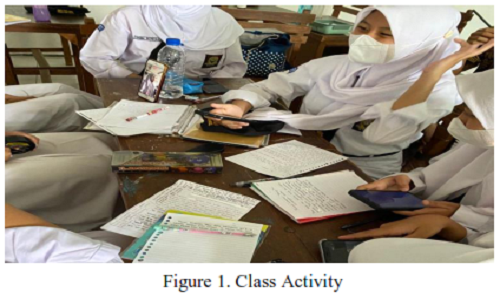
The Correlation Between PBL (Project-Based Learning) and Learning Motivation in ELT Classes
Abstract
Keywords
Full Text:
PDFReferences
Ahmad, M. (2021). Management of Project-Based Learning Model at Sekolah Alam Junior High School. Al-Ishlah: Jurnal Pendidikan, 13(2), 1153–1156.
Ayu, M., & Yuliansyah, A. (2021). The Implementation of Project-Based Assignment in Online Learning During Covid-19. Journal of English Language Teaching and Learning (JELTL), 2(1), 33-36.
Anita, Chairilsyah, D., & Kartikowati, S. (2022). The Influence of Principal Leadership and Work Motivation on Teacher Performance at Elementary School. 6(3), 434.
Bell, S. (2010). Project-Based Learning for the 21st Century: Skill for the Future. 83(2), 39-43.
Brown, P., Lauder, H., & Ashton, D. (2008). Education, Globalization and The Knowledge Society. London: The Teaching and Learning Research Programme. 7.
Chang, C.-C., Kuo, C.-G., & Chang, Y.-H. (2018). An Assessment Tool Predicts Learning Effectiveness for Project-Based Learning in Enhancing Education of Sustainability. Sustainability, 10(10), 4-7.
Eccles, J. S., & Wigfield, A. (1995). In the Mind of the Actor: The Structure of Adolescents’ Achievement Task Values and Expectancy-Related Beliefs. Personality and Social Psychology Bulletin, 21(3), 215–225.
Howard, J. (2002). Technology-Enhanced Project-Based Learning in Teacher Education. Technology and Teacher Education, 10(3), 343-364.
Liu, X. (2016). Motivation Management of Project-Based Learning for Business English Adult Learners. International Journal of Higher Education, 5(3), 140.
Miftahuddin, Pratama, A., & Setiawan, I. (2021). Analisis Hubungan Antara Kelembaban Relatif dengan Beberapa Variabel Iklim dengan Pendekatan Korelasi Pearson di Samudera Hindia. Jurnal Siger Matematika, 02(1), 27.
Nunan, D., & Bailey, K. M. (2009). Exploring Second Language Classroom Research: A comprehensive guide. Boston: Heinle, Cengage Learning.
Purnama, N. A., Rahayu, N. S., & Yugafiati, R. (2019). Students’ Motivation in Learning English. PROJECT (Professional Journal of English Education), 2(4), 539-540.
Siswanto, B. T. (2012). Model for Implementation of Work-Based Learning in Automotive Diploma III Vocational Education. Jurnal pendidikan vokasi, 2(1), 11–26.
Shin, M.-H. (2018). Effects of Project-based Learning on Students’ Motivation and Self-efficacy. English Teaching, 73(1), 96-98.
Solomon, G. (2003). Project-based learning: A primer. Technology & Learning, 23(6), 2.
Sudjimat, D. A., Tuwoso, Permadi, L. C. (2021). Impact of Work and Project-Based Learning Models on Learning Outcomes and Motivation of Vocational High School Students. Educational Sciences:Theory and Practice, 21(2),136-137.
Sukmadinata, N. S. (2011). Metode Penelitian Pendidikan (3 ed). Bandung: Remaja Kosda Karya.
Thomas, J. W. (2000). A Review of Research on Project-Based Learning. San Rafael, CA: Autodesk.6.
Wahyudin, A. Y. (2017). The Effect of Project-Based Learning on L2 Spoken Performance of Undergraduate Students in English for Business Class. Proceedings of the Ninth International Conference on Applied Linguistics (Conaplin 9). Ninth International Conference on Applied Linguistics (Conaplin 9), 13(2), 43-45
Wongdaeng, M., & Hajihama, S. (2018). Perceptions of Project-Based Learning on Promoting 21st Century Skills and Learning Motivation in a Thai EFL setting. Journal of Studies in the English Language, 13(2), 159 & 180.
DOI: http://dx.doi.org/10.31258/jes.7.3.p.442-451
Refbacks
- There are currently no refbacks.
Copyright (c) 2023 Auliya Rahma Maziidah, Dian Novita Dewi

This work is licensed under a Creative Commons Attribution 4.0 International License.
Publisher: FKIP Universitas Riau












